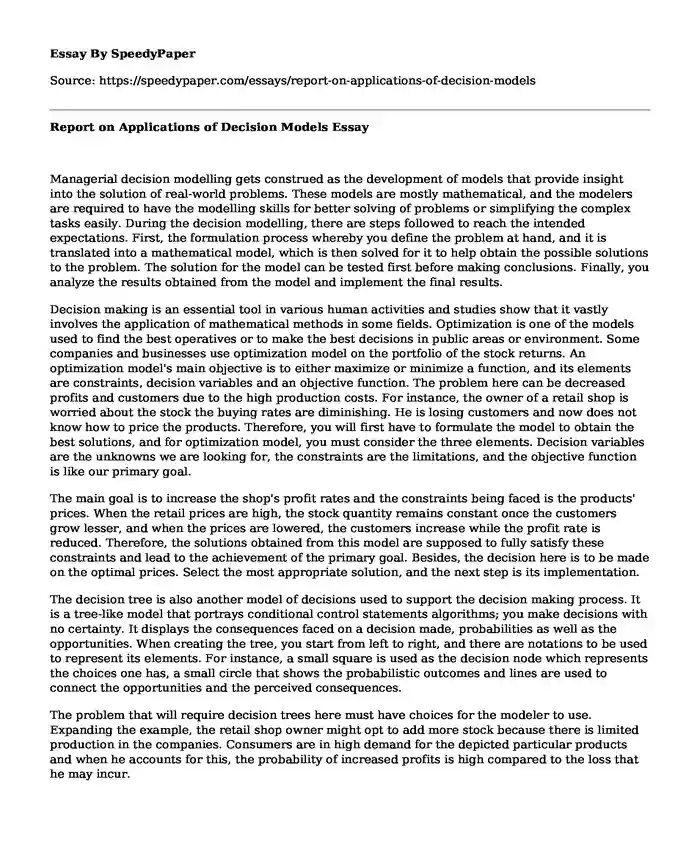
| Type of paper: | Report |
| Categories: | Strategic management |
| Pages: | 4 |
| Wordcount: | 833 words |
Managerial decision modelling gets construed as the development of models that provide insight into the solution of real-world problems. These models are mostly mathematical, and the modelers are required to have the modelling skills for better solving of problems or simplifying the complex tasks easily. During the decision modelling, there are steps followed to reach the intended expectations. First, the formulation process whereby you define the problem at hand, and it is translated into a mathematical model, which is then solved for it to help obtain the possible solutions to the problem. The solution for the model can be tested first before making conclusions. Finally, you analyze the results obtained from the model and implement the final results.
Decision making is an essential tool in various human activities and studies show that it vastly involves the application of mathematical methods in some fields. Optimization is one of the models used to find the best operatives or to make the best decisions in public areas or environment. Some companies and businesses use optimization model on the portfolio of the stock returns. An optimization model's main objective is to either maximize or minimize a function, and its elements are constraints, decision variables and an objective function. The problem here can be decreased profits and customers due to the high production costs. For instance, the owner of a retail shop is worried about the stock the buying rates are diminishing. He is losing customers and now does not know how to price the products. Therefore, you will first have to formulate the model to obtain the best solutions, and for optimization model, you must consider the three elements. Decision variables are the unknowns we are looking for, the constraints are the limitations, and the objective function is like our primary goal.
The main goal is to increase the shop's profit rates and the constraints being faced is the products' prices. When the retail prices are high, the stock quantity remains constant once the customers grow lesser, and when the prices are lowered, the customers increase while the profit rate is reduced. Therefore, the solutions obtained from this model are supposed to fully satisfy these constraints and lead to the achievement of the primary goal. Besides, the decision here is to be made on the optimal prices. Select the most appropriate solution, and the next step is its implementation.
The decision tree is also another model of decisions used to support the decision making process. It is a tree-like model that portrays conditional control statements algorithms; you make decisions with no certainty. It displays the consequences faced on a decision made, probabilities as well as the opportunities. When creating the tree, you start from left to right, and there are notations to be used to represent its elements. For instance, a small square is used as the decision node which represents the choices one has, a small circle that shows the probabilistic outcomes and lines are used to connect the opportunities and the perceived consequences.
The problem that will require decision trees here must have choices for the modeler to use. Expanding the example, the retail shop owner might opt to add more stock because there is limited production in the companies. Consumers are in high demand for the depicted particular products and when he accounts for this, the probability of increased profits is high compared to the loss that he may incur.
Although the profits rate is seen to improve when other companies run out of the products, the retail shop owner is not sure whether the business will be right at that time. If the sales are poor the consequences are that he will suffer a significant loss compared to if the deals turn out to be good. However, if he does not make a move by purchasing these goods, there is a high probability of experiencing even more loses. He might have to reduce the retail prices for the customers to get them quickly and fast thus decreased buying rate. The decision tree model is formulated at this point. It can be drawn since it is a visual presentation of its three elements stated earlier.
Similarly, the solutions obtained from the decision tree model should also attain the primary goal of the process. Using this model, the persons should be aware of the kind of risks they are getting into following the choices they make. Solving the decision tree is also done from left to right, and the final decision made can either be based or created using the Expected returns approach, maxi max or maximin. The expected returns when the retail adds the goods is more favorable. Therefore, he implements the final decision made that will benefit the business.
The other managerial decision models include portfolio optimization, game theory model and also demand forecasting. In all these models, the same steps should be followed although some of them have mathematical formulations. They all must ensure proper and careful solving of the decision problems.
Cite this page
Report on Applications of Decision Models. (2023, Mar 14). Retrieved from https://speedypaper.com/essays/report-on-applications-of-decision-models
Request Removal
If you are the original author of this essay and no longer wish to have it published on the SpeedyPaper website, please click below to request its removal:
- Law Essay Example: Alternative Legal Venues
- Free Essay: Non-Conventional Practices in Healthcare
- Literary Essay Sample on How Cole Learns to Live and Heal from His Anger
- Personal Experience Essay Example: Chinese in America
- Essay Sample: New Channel Optimization in Hospitality
- Essay Example on the Impacts of Immigration
- Essay Sample on Theology and Civil Rights
Popular categories




